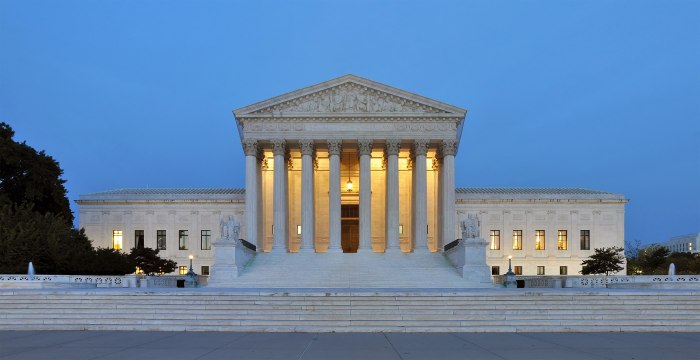BY ARTHUR S. LEONARD | The Court of Appeals, New York State's highest bench, in a decision announced March 31, unanimously affirmed jury verdicts for two New York City Police Department officers who claimed they suffered retaliation for opposing discrimination against another officer perceived as being gay.
The jury had awarded Lori Albunio $579,728.83 and Thomas Connors $588,113.45, plus attorneys fees.
Cops shafted after opposing anti-gay bias prevail; officer who struck out at them keeps climbing ladder
Albunio was commanding officer of the Youth Services section and Connors served as its operations coordinator. Officer Robert Sorrenti applied to transfer into the unit, and Albunio, after interviewing him, recommended him for a specific vacancy working with kids. The recommendation went to James Hall, commanding officer of Community Affairs, who decided to interview Sorrenti himself before approving the transfer.
Hall evidently perceived Sorrenti to be gay and decided not to approve the transfer. The high court stated that based on the evidence presented at trial, the jury could reasonably have concluded Hall believed gay people should not be assigned to work with youth.
Hall found somebody else to fill the vacant position in Youth Services, and told Albunio “that there was something not right about that guy” and that he “found out some fucked up shit about Sorrenti and… wouldn't want him around children.” Later, Hall called Connors into his office and spoke angrily about Sorrenti, using “many expletives,” speculating there was something going on between Sorrenti and another male officer to whom he had loaned money. Hall said he “wouldn't be able to sleep at night knowing that Sorrenti is going to be working around kids.”
Connors responded by saying he thought Sorrenti “would be more than qualified to work around kids.”
In the fall of 2002, Albunio heard rumors she was being transferred out of Youth Services and asked for a meeting with Deputy Commissioner Frederick Patrick. Hall was present at the meeting. When Albunio asked why she was being relieved of her command, she was told she used poor judgment in requesting personnel; Sorrenti was cited as the primary example. Albunio responded that “Sorrenti was the better candidate” and that she would recommend him again. She was told to find a different assignment and ended up in a less desirable post.
When Albunio told Connors, her subordinate, what happened, he filed a complaint with the police department's Equal Employment Opportunity Office, alleging that Hall discriminated against Sorrenti because of his perceived sexual orientation. (Ultimately, Sorrenti also filed a discrimination suit against the NYPD, winning a jury verdict of $491,706 plus legal fees, which the Appellate Division upheld. Presumably the city didn't settle that case outright because the officers denied the discrimination allegations. The jury, however, believed the testimony of Albunio, Connors, and Sorrenti.)
Connor's complaint brought the matter back to Hall's attention, and Connors, probably correctly perceiving his position there was in danger with Albunio's removal, resigned from Youth Services. The replacement position he was given was a boring desk job, an assignment that formed the basis of his retaliation claim.
In their claims, Albunio and Connors asserted they suffered adverse consequences for opposing discrimination against Sorrenti. A five-judge panel of the Appellate Division affirmed the jury's verdict and substantial damage and fee awards in their favor, with one judge dissenting regarding Albunio’s case. The dissenter accepted the city's argument that Albunio only opposed discrimination against Sorrenti when informed she was being relieved of her Youth Services post, but the majority credited the argument that her assignment to a comparatively undesirable position followed her defense of him during the meeting with Patrick and Hall.
The Court of Appeals noted that New York City's Local Civil Rights Restoration Act of 2005 required it to be liberal in interpreting the plaintiffs’ claims of having suffered retaliation for opposing discrimination. The court found Connors’ claims easy to evaluate, since his adverse treatment on the force followed the discrimination complaint he filed.
Albunio presented the harder case, as the Appellate Division dissent indicated. Writing for the Court of Appeals, Judge Robert Smith acknowledged the record showed that while she was unhappy her candidate had not gotten the job, Albunio mounted no “opposition” to the discriminatory treatment Sorrenti suffered until she sat down with Patrick and Hall.
Albunio’s statements backing up Sorrenti in that meeting, however, were critical in the court’s view.
“While she did not say in so many words that Sorrenti was a discrimination victim,” Smith wrote, “a jury could find that both Hall and Albunio knew that he was, and that Albunio made clear her disapproval of that discrimination by communicating to Hall, in substance, that she thought Hall's treatment of Sorrenti was wrong. Bearing in mind the broad reading that we must give to the New York City Human Rights Law, we find that Albunio could be found to have 'opposed' the discrimination against Sorrenti at the October 31 meeting.”
More than eight years after that meeting –– and 16 months after these two verdicts were upheld by the intermediate level Appellate Division –– Hall remains on the force. In fact, even though his discriminatory actions have cost the city well more than over $2 million dollars in damages and plaintiffs' attorneys fees –– not to mention legal expenses incurred by the city –– Hall, in March 2010, was promoted to chief of patrol, where his responsibilities are to “plan, direct and coordinate the development of the Police Department's uniformed officers on patrol in eight borough commands.”
Asked about Hall's continued rise at the NYPD, its deputy commissioner for public information, Paul J. Browne, in an email message, wrote, “Chief Hall is an unbiased, highly decorated, outstanding commander, with an unblemished record. The fact remains that the police officer’s failure to receive the assignment he requested had nothing to do whatsoever with sexual orientation or perceived sexual orientation. Further, there was no retaliation against the officer’s advocates.”


































